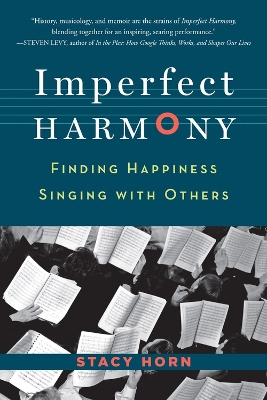Reviewed by lovelybookshelf on
Professionally, I'm an instrumentalist, not a singer. I'm in the flute section of a symphony, I work as a church pianist, I teach private lessons, and I play chamber music, weddings, and other gigs. The church choir where I work is small, and often there aren't enough altos to carry the part. So in the past year or so, I've tried my best to help from the piano whenever I can, singing along with my amateur-but-nice-enough voice; and I've discovered that I love to sing! So it was interesting to read Imperfect Harmony from the perspective of a professional in classical music, yet also as a (very) amateur singer.
Horn's experiences in the Choral Society of Grace Church are vividly brought to life in her book. I often felt that I was right there in the room, in the choir, having the very same experiences. She seamlessly and naturally interlaces music history with her stories. Before I knew it, I realized I'd just read pages of - gasp! - music history, and didn't find one bit of it dry. I couldn't stop turning the pages. I wish my own college music history texts had been as captivating. Horn also does a wonderful job describing more advanced musical concepts in layman's terms, which helps to keep the book accessible to all music lovers. She cites studies that give insight into why singing feels so good and how it affects us emotionally and physiologically. Even with the inclusion of history, a bit of music theory, and science, the flow of her words is never once broken. The reading never felt bogged down.
I cried while reading stories about how song came forth, often spontaneously, out of moments of deep grief to help carry people through. I laughed while reading some of the interactions between choir members, especially the "where to sit" and "someone's in my chair" antics. I texted my soprano best friend during that chapter and asked her, "Do you all have assigned seats in Choral Society?" She replied with, "No... but no one better ever sit in my chair!" I highlighted on my Nook like mad, taking special note of the many thought-provoking quotes by famous composers, conductors, and music educators; gems of knowledge and experience that I'm sure I'll pass on to my own music students.
Imperfect Harmony inspired me to listen more often, too. More often than I care to admit, I find myself listening to music out of necessity: I'll soon be performing the piece and need to study the score, or I have a student is learning a piece and I need to get to know it again. Horn's honest and heartfelt appreciation of each piece highlighted in the book compelled me to find recordings of each, put them in one playlist, and simply take in the music. We professionals forget to do that at times.
I have a few friends who will be receiving this book as a gift when it is released (April 9, 2013, Algonquin Books). If you love to sing with others...actually, disregard "to sing." If you love making music with others, you will love this book.
Reading updates
- Started reading
- 9 January, 2013: Finished reading
- 9 January, 2013: Reviewed
